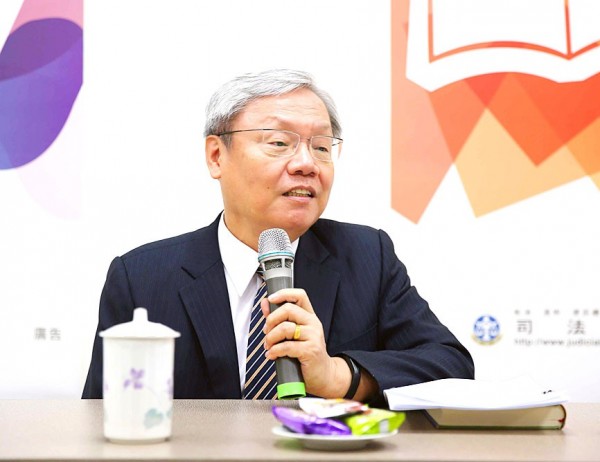《TAIPEI TIMES 焦點》Presidential Office denies judicial interference

Outgoing Judicial Yuan Vice President Su Yeong-chin speaks as a news conference in Taipei yesterday. Photo: CNA
‘SPEARHEAD’: Spokesman Alex Huang said opinion polls suggest that the public has high expectations of judicial reform and Tsai Ing-wen must shoulder the responsibility
By Stacy Hsu / Staff reporter
Outgoing Judicial Yuan Vice President Su Yeong-chin’s (蘇永欽) accusations that President Tsai Ing-wen (蔡英文) is interfering with the judicial system are “regrettable” and “diverge from contemporary values,” Presidential Office spokesman Alex Huang (黃重諺) said yesterday.
“Judicial independence has three major characteristics: independent decisionmaking, personnel management and budget,” Huang told a routine media briefing at the Presidential Office.
The spokesman said that having the president lead judicial reform and push for general systematic renewals neither affects the independence of the judiciary’s decisionmaking and personnel management, nor its budgetary autonomy.
“Tsai’s role is merely to set the general direction for the government’s judicial reform endeavors. It surely does not constitute interference with judicial independence,” Huang said.
Citing Article 44 of the Constitution, Huang said the president has the right to call a meeting of leaders of concerned government branches for consultation, with the goal of reaching a solution should disputes occur between more than two branches of government.
As intergovernmental disputes remain the greatest impediment to the promotion of judicial reform, it is necessary for the president to play a coordinating role, Huang said, adding that Tsai’s plan to hold a national affairs conference on judicial reform is aimed at building an open, objective and transparent deliberative platform that invites public participation.
“The results of many opinion polls have suggested that the public has high expectations of judicial reform. As a popularly elected head of state, Tsai must shoulder this responsibility and spearhead the reforms,” Huang said.
On Su’s remarks, “which apparently diverge from contemporary values, we can only express regret,” Huang added.
Huang was referring to criticism leveled by Su against Tsai at a news conference in Taipei yesterday morning, during which the outgoing deputy head of the Judicial Yuan made public a resignation letter he wrote to the president on May 24.
Su held the news conference a day after Tsai approved his and outgoing Judicial Yuan President Rai Hau-min’s (賴浩敏) resignations, before picking Judicial Yuan Secretary-General Lin Chin-fang (林錦芳) and Public Functionary Disciplinary Sanction Commission Chief Commissioner Hsieh Wen-ting (謝文定) to succeed them.
The pair’s nominations have been sent to the Legislative Yuan for approval.
“The reasons Lai and I chose to resign were absolutely not because of the transfer of presidential power, but rather to leave the top posts in the Judicial Yuan to people who are more like-minded with Tsai, so that she can push for judicial reform,” Su told the news conference.
Su said another reason behind his resignation was the president directly intervening in the promotion of judicial reform, which he said should be spearheaded independently by the Judicial Yuan.
Even though former presidents Lee Teng-hui (李登輝), Chen Shui-bian (陳水扁) and Ma Ying-jeou (馬英九) were also concerned about the judicial system, they all let the Judicial Yuan take charge of judicial reform, Su added.
In his resignation letter, Su said that the Judicial Yuan is not part of the “new government,” because the Constitution does not directly bestow upon the president the right to lead judicial reform.
He also took issue with Tsai’s plan to establish a preparatory committee for a national affairs conference on judicial reform that falls under the Presidential Office.
To ensure public participation, only less than half of the committee’s 15 to 21 seats are to be filled by judicial experts.
新聞來源:TAIPEI TIMES












